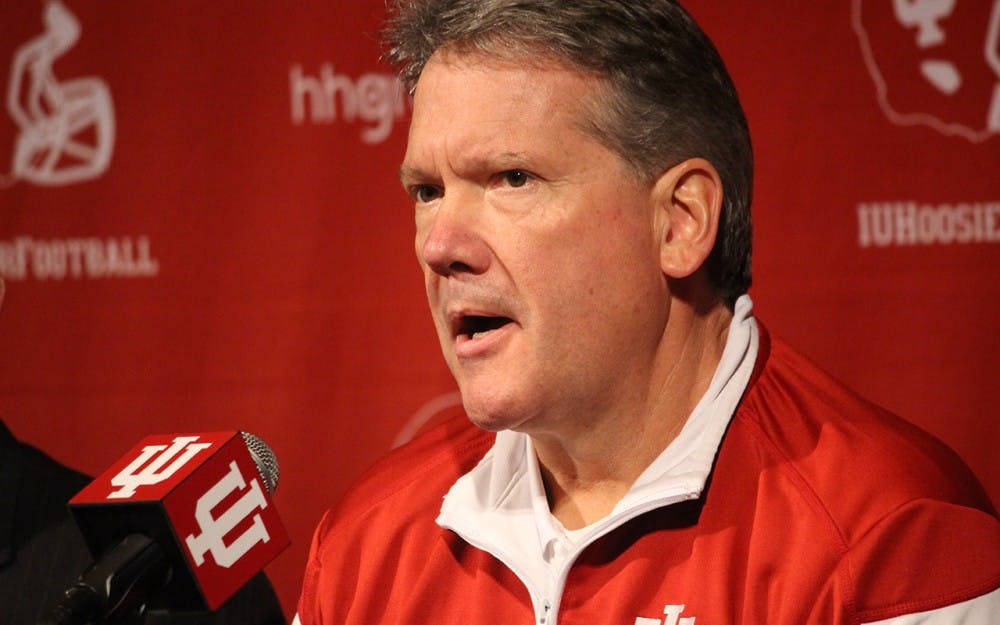In the past few days, a lot of questions have gone unanswered about IU Coach Kevin Wilson’s departure from IU.
Why did he resign?
Why would he leave millions of dollars on the table and settle for about half a million?
What did he do?
Many current and former players have come forward with stories of all kinds about Wilson. Those stories have commended his character and described his love for his players and their disbelief regarding the end of his IU career. A lot of typical we-love-you-coach type stuff.
On the other hand, some former players wrote on Twitter and told the Indiana Daily Student about Wilson’s downfalls. He allegedly pressured players to play through injuries and built a culture of fear to discourage reporting these injuries.
Like with most of IU’s other flaws — things like Alpha Tau Omega’s video leak and other campus sexual assaults — that get national attention, this isn’t just an IU problem. It’s a national problem.
IU isn’t the only school with fraternity problems. IU isn’t the only school with sexual assault problems. It likely isn’t the only school with a problematic coach, either.
In 2009, Mike Leach was fired from Texas Tech after refusing to apologize to a player he allegedly forced into a storage closet as punishment. That same month, Kansas’ Mark Mangino was asked to resign amid allegations of verbal and physical abuse of players.
This problem even exists among Big Ten programs in cases like Rutgers’ Mike Rice, Ohio State’s Woody Hayes and most recently Illinois’ Tim Beckman, who was dismissed just before the 2015 season after accusations similar to Wilson’s arose. However, North Carolina still picked up Beckman as a volunteer assistant. He resigned after the rest of the world realized North Carolina was OK with having someone who neglected his players’ injuries.
This calls to mind Liberty University’s recent hiring of former Baylor Athletic Director Ian McCaw, who resigned as a scandal unfolded involving allegations that athletes had been repeatedly accused of sexual assault and administrators did nothing.
All these hirings and firings lead to one question. How much do colleges care about their athletes?
I believe IU Athletics Director Fred Glass is a nice guy who probably does care about athletes individually. Otherwise, the department wouldn’t have let go of a coach who took a team from 1-11 to 6-6. It would have held him tight as long as the problems weren’t public.
The NCAA will say it cares about athletes, too. However, to the institution, players are just dollar signs.
Billions of dollars circulate in and out of the NCAA. Players don’t see that money.
Yes, they do get an education or at least part of one, but other than that, not much.
Coaches are paid millions to tear them apart mentally and physically. As long as they get results, who cares? Look at Bobby Knight: years and years of televised tantrums and other alleged abuse, but the University didn’t fire him until 2000 — long past his prime.
In the NCAA’s 2010 Growth, Opportunities, Aspirations, and Learning of Students in College survey, 31 percent of men’s basketball players and 22 percent of football players somewhat or strongly agreed their head coach puts them down in front of others. Only about half said their head coaches could be trusted.
These questions did not reappear on the 2015 report of the study.
What universities don’t realize, though, is it’s not just the student athletes being hurt by this. In a study published by the American Psychological Association, researchers found athletes with abusive coaches are more willing to cheat than athletes with more ethical coaches.
I get it. Sports are rough. A lot of former athletes say their angry coaches made them better. The older generation has the whole, “Well, back in my day ...” thing going for it where they played until they physically could not stand, and then some.
However, medical technology has advanced. We know CTE is a thing. We know injuries like blood clots are not to be taken lightly.
We don’t know for sure why Wilson resigned, but if these allegations of ignoring injuries and putting down those injured are true, perhaps it’s best the athletic department stepped up and said something about the first coach in 25 years to lead the Hoosiers to back-to-back bowl games.
It’s a step in the right direction.






